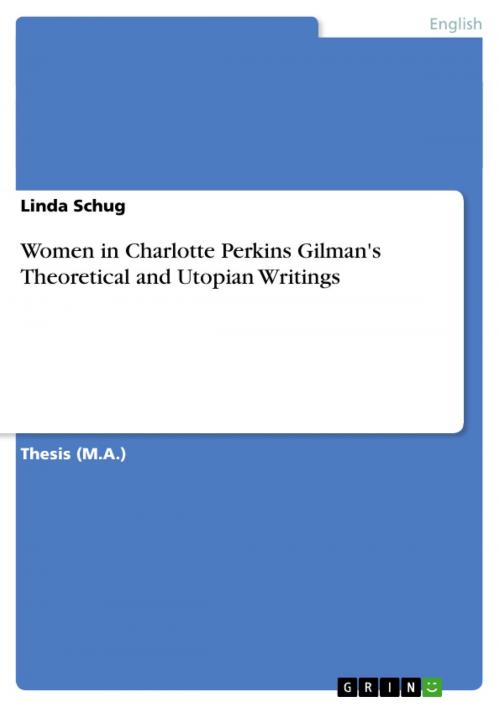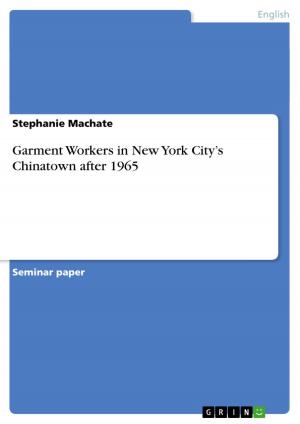Women in Charlotte Perkins Gilman's Theoretical and Utopian Writings
Nonfiction, Entertainment, Drama, Anthologies| Author: | Linda Schug | ISBN: | 9783638444583 |
| Publisher: | GRIN Publishing | Publication: | December 2, 2005 |
| Imprint: | GRIN Publishing | Language: | English |
| Author: | Linda Schug |
| ISBN: | 9783638444583 |
| Publisher: | GRIN Publishing |
| Publication: | December 2, 2005 |
| Imprint: | GRIN Publishing |
| Language: | English |
Thesis (M.A.) from the year 2005 in the subject American Studies - Literature, grade: 2,7, University of Frankfurt (Main), 74 entries in the bibliography, language: English, abstract: [...] Starting with the realistic short fiction, I will show Gilman's main ideas to resolve typical problems of women with the example of some selected stories. I resolved to treat them not in chronological order but to delineate the structural changes in the different levels of social organization that are to be discerned. Moreover I decided to use two narratives in each subdivision because choosing only one would not do justice to the scope of Gilman's imagination and would reduce the findings to be made. So, for example, in both writings of each partition, changes take place in varying degrees and are initiated by different types of characters. The first stories, 'Making a Change' and 'A Garden of Babies,' illustrate the imagined transformation of middle-class women and the betterment of their situation by gainful employment. In addition, 'Martha's Mother' and 'Forsythe & Forsythe' promote changed living conditions as well. Whereas the next two stories, 'Three Thanksgivings' and 'Mrs. Hines' Money,' describe possibilities of human intercourse and the influence of reform clubs on society, the last pair, 'Aunt Mary's Pie Plant' and 'Bee Wise,' take women's united power to a more utopian extreme and most fully fictionalize the author's theories as short stories. Similarly, in the fifth chapter, there will be an intensification of Gilman's utopian thinking that is curiously more analogous to the year of publication. The selected pragmatopian novels, The Crux and What Diantha Did, are followed up by the two utopian works, Moving the Mountain and Herland. The sequel of the latter and her last published novel, With Her in Ourland (1916), however, is a dystopia and therefore left out here. In this negative utopia, Gilman mainly criticizes the contemporary situation. It seems to reflect that, as Golden and Knight state, 'she lamented the turn of events for women, who, in her opinion, had made little progress toward gaining equality, particularly compared to the widespread transformation she had envisioned for her society and advanced through her theoretical works' (216).
Thesis (M.A.) from the year 2005 in the subject American Studies - Literature, grade: 2,7, University of Frankfurt (Main), 74 entries in the bibliography, language: English, abstract: [...] Starting with the realistic short fiction, I will show Gilman's main ideas to resolve typical problems of women with the example of some selected stories. I resolved to treat them not in chronological order but to delineate the structural changes in the different levels of social organization that are to be discerned. Moreover I decided to use two narratives in each subdivision because choosing only one would not do justice to the scope of Gilman's imagination and would reduce the findings to be made. So, for example, in both writings of each partition, changes take place in varying degrees and are initiated by different types of characters. The first stories, 'Making a Change' and 'A Garden of Babies,' illustrate the imagined transformation of middle-class women and the betterment of their situation by gainful employment. In addition, 'Martha's Mother' and 'Forsythe & Forsythe' promote changed living conditions as well. Whereas the next two stories, 'Three Thanksgivings' and 'Mrs. Hines' Money,' describe possibilities of human intercourse and the influence of reform clubs on society, the last pair, 'Aunt Mary's Pie Plant' and 'Bee Wise,' take women's united power to a more utopian extreme and most fully fictionalize the author's theories as short stories. Similarly, in the fifth chapter, there will be an intensification of Gilman's utopian thinking that is curiously more analogous to the year of publication. The selected pragmatopian novels, The Crux and What Diantha Did, are followed up by the two utopian works, Moving the Mountain and Herland. The sequel of the latter and her last published novel, With Her in Ourland (1916), however, is a dystopia and therefore left out here. In this negative utopia, Gilman mainly criticizes the contemporary situation. It seems to reflect that, as Golden and Knight state, 'she lamented the turn of events for women, who, in her opinion, had made little progress toward gaining equality, particularly compared to the widespread transformation she had envisioned for her society and advanced through her theoretical works' (216).















